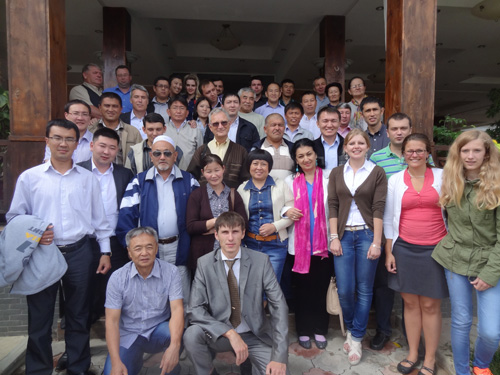One of the main problems that were addressed by the religious groups is the compulsory registration system. In order to achieve registration a religious group is required to provide a list of 200 founders, including personal data of each of them, in one area. Proselytism is in practice banned, and foreign missionaries struggle to get visas or renewal after three years. Burial of converts is another controversial issue. Families who want to bury their loved one are met by mobs with stones and sticks that chase them away from the graveyard.
– Kyrgyzstan’s restrictive laws and complex registrations procedures create substantial obstacles for law-abiding religious organizations, whereas the extremists that are the official targets of the restrictions are not known to abide by any laws, said Wetteland.
The experts at the seminar introduced the audience to the multifaceted history of Kyrgyzstan when it comes to religion, people and culture and cautioned against naming any of them traditional or non-traditional, which is common in the discourse. In fact, scientist of religious studies Indira Aslanova pointed out that terms like “destructive sects” and “non-traditional religions” are inaccurate and inappropriate in religious science, and should not be used in serious debate on the topic.
Local human rights activists Dmitry Kabak and Almaz Esengeldiev outlined the main international human rights standards and institutions relevant for freedom of religion or belief, and encouraged religious groups to pay attention to draft laws and make use of the international complaint mechanisms that exist.
A representative of the State Commission for Religious Affairs (SCRA), Head of Department Kanybek Mamataliev, warned that this is a time-consuming and difficult process. He actively participated in the sessions, in particular challenged presenters at the seminar to also mention positive aspects of Kyrgyzstan’s policies. International law accepts limitations of freedom of religion or belief, he said, referring to the UN Covenant and Civil and Political Rights Article 18(3).
– In the view of the Norwegian Helsinki Committee, however, this right of states to limit freedom of religion or belief is only linked to manifestations of one’s belief, said Wetteland. The article states, “Freedom to manifest one’s religion or beliefs may be subject only to such limitations as are prescribed by law and are necessary to protect public safety, order, health, or morals or the fundamental rights and freedoms of others.” It cannot be used as a legitimization of cumbersome registrations procedures or prohibition of unregistered religious groups. Moreover, freedom of religion or belief is a so-called non-derogable right, which means it cannot be set aside regardless of any emergency.
Lawyers at the seminar analyzed relevant Kyrgyzstani legislation and the role of state institutions, and reminded the religious groups that they could also send complaints for inaction by the authorities. Ed Brown of the Stefanus Alliance, a Norwegian non-governmental organization, and Lene Wetteland of the NHC also addressed the seminar, providing international perspectives, including an introduction to relevant Norwegian legislation on religion.
With its carefully planned layout and wide participation, the three day seminar is the first of its kind in Kyrgyzstan. Religious groups as well as representatives of Kyrgyzstani authorities highlighted the importance of the seminar, in particular its role as platform for discussion. A similar seminar takes place the first week of July, and with the great demand for participation even from Kazakhstan, there are plans to arrange another seminar later this summer as well.
Background:
The seminar was organized by one of the very few non-governmental organisations in Kyrgyzstan that monitor the situation on freedom of religion or belief in the country, Open Viewpoint, with support from the Norwegian Helsinki Committee’s Freedom of Religion in Central Asia program. In this program, the NHC cooperates with Forum18, the Stefanus Alliance, the Oslo Center for Peace and Human Rights and the Oslo Coalition on Freedom of Religion or Belief, on monitoring, dialogue and advocacy in Central Asia, in particular in Kazakhstan and Kyrgyzstan.
A report, Broken Promises: Freedom of Religion or Belief in Kazakhstan and Kyrgyzstan, was launched in Astana in 2010, and an updated version will be launched in autumn 2013. In parallel, the NHC and the Oslo Center have carried out high level dialogue meetings in Kazakhstan and Kyrgyzstan as well as visits and talks with representatives of religious groups and non-governmental organizations in the two countries.
